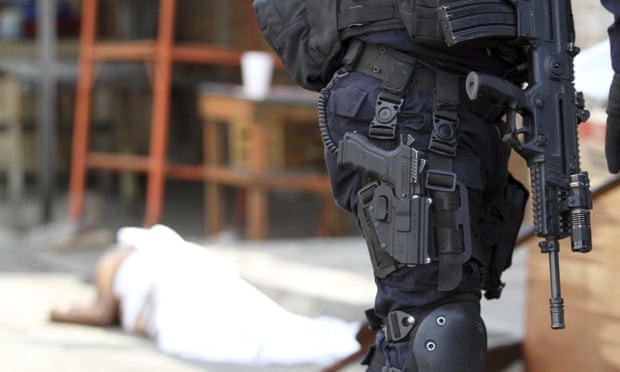Figures show 28,816 homicides, a 15% increase over the previous year, attributed to drug war and other illegal markets
Mexico’s murder rate broke a new record in 2018 as the country’s drug war dragged on and criminal groups fought for control of an increasingly diversified range of illegal activities.
Figures released this week by the country’s public safety secretariat show that 28,816 homicide case files were opened in 2018, a 15% increase over the previous year.
In recent years, violence has exploded in previously peaceful areas of the country such as Quintana Roo state, which registered 763 homicides in 2018 – double the 2017 figure.
Conflict in Quintana Roo – home of the Caribbean resort cities of the “Mexican Riviera” – has been attributed to a struggle for smuggling routes and local drug markets, but in other regions, violence has been driven by other illegal markets.
In the western state of Guanajuato, homicide rates have been sent soaring by an epidemic of fuel theft – in which gasoline is siphoned from pipelines. Guanajuato, the country’s conservative, Catholic heartland recorded 2,609 homicides in 2018, making it the most murderous state in Mexico.
The new murder figures underline the scale of the challenge facing President Andrés Manuel López Obrador, who took office on 1 December promising to calm the country after 12 years of a militarised crackdown on drug cartels and organised crime.
Quick guide
Mexico's war on drugs

Why did Mexico launch its war on drugs?
On 10 December 2006, Felipe Calderón launched Mexico’s war on drugs by sending 6,500 troops into his home state of Michoacán, where rival cartels were engaged in tit-for-tat massacres.
Calderón declared war eight days after taking power – a move widely seen as an attempt to boost his own legitimacy after a bitterly contested election victory. Within two months, around 20,000 troops were involved in operations.
What has the war cost so far?
The US has donated at least $1.5bn through the Merida Initiative since 2008, while Mexico spent at least $54bn on security and defence between 2007 and 2016. Critics say that this influx of cash has helped create an opaque security industry open to corruption.
But the biggest costs have been human: since 2007, over 250,000 people have been murdered, more than 40,000 reported as disappeared and 26,000 unidentified bodies in morgues across the country. Human rights groups have also detailed a vast rise in human rights abuses including torture, extrajudicial killings and forced disappearances by state security forces.
Peña Nieto claimed to have killed or detained 110 of 122 of his government's most wanted narcos. But his biggest victory – and most embarrassing blunder – was the recapture, escape, another recapture and extradition of Joaquín “El Chapo” Guzmán, leader of the Sinaloa cartel.
Mexico’s decade-long war on drugs would never have been possible without the injection of American cash and military cooperation under the Merida Initiative. The funds have continued to flow despite indisputable evidence of human rights violations.
Under new president Andrés Manuel López Obrador, murder rates are up and a new security force, the Civil Guard, is being deployed onto the streets despite campaign promises to end the drug war.
What has been achieved?
Improved collaboration between the US and Mexico has resulted in numerous high-profile arrests and drug busts. Officials say 25 of the 37 drug traffickers on Calderón’s most-wanted list have been jailed, extradited to the US or killed, although not all of these actions have been independently corroborated.
The biggest victory – and most embarrassing blunder – under Peña Nieto’s leadership was the recapture, escape and another recapture of Joaquín “El Chapo” Guzmán, leader of the Sinaloa cartel.
While the crackdown and capture of kingpins has won praise from the media and US, it has done little to reduce the violence.
Photograph: Pedro Pardo/AFP
López Obrador, known as Amlo, campaigned on a promise to tackle what he considered the root causes of crime such as poverty and a lack of opportunity, but has caused some disquiet by announcing plans for creating a militarised police force despite accusations that the country’s armed forces have themselves contributed to the rising violence.
“The creation of the [national guard] is popular among the political class and society in general. But the fuel that feeds it [is] political opportunism and social desperation in the face of violence,” wrote Ernesto Portillo, technical secretary of the Mexican Forum for Democratic Security, in Animal Político.
López Obrador has so far focused efforts on an attempt to stamp out fuel theft, which he said costs the country $3bn annually. The crackdown has caused long fuel lines in at least six states and prompted accusations that the crackdown had been improvised.
The seriousness of the problem was brought home last Friday, when at least 93 people died after a tapped fuel pipeline exploded in central Hidalgo state. On Monday, the government reported that 14,894 such illegal taps had been found in 2018 – an average of about 41 a day nationwide.
https://www.theguardian.com/world/2019/jan/22/mexico-murder-rate-new-record-2018-drug-war

No comments:
Post a Comment